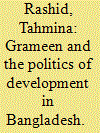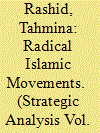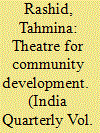| Srl | Item |
| 1 |
ID:
115249


|
|
|
|
|
| Publication |
2012.
|
| Summary/Abstract |
Bangladesh is one of the countries with a thriving political culture, vibrant civil society and a huge development sector, yet struggling with the issues of persisting poverty as a substantial majority still lives below the poverty line. The development sector has largely maintained an apolitical posture focusing on expanding their outreach, commercial enterprises and access to donor assistance. As a consequence of new economic realities and dynamics of financial markets at local and global level, the sector is increasingly being pushed to expand its influence in the local power structures, thus shifting the nature of their relationship-from a non-engaged to an actively engaged relationship with the state. This article would argue that the increasing commercial/entrepreneurial activities are reshaping the development sector in Bangladesh, even overhauling the dynamics of the socio-economic and political scene. As these not-for-profit organisations are entering into a state-regulated sector, in which other actors (business houses) are already operating, lobbying to protect similar commercial interests, there are contestations around regulatory regimes and political agency in policy-making arenas. Recent controversy around Yunus's role in the Grameen Bank is indicative of the shifting nature of developmental politics.
|
|
|
|
|
|
|
|
|
|
|
|
|
|
|
|
| 2 |
ID:
089255


|
|
|
|
|
| Publication |
2009.
|
| Summary/Abstract |
A nation-state has a responsibility to protect its women as equal citizens, yet states like Pakistan have structurally disenfranchised women from state protection by making them half citizens and reducing their right to be their own legal person. As a consequence, women have been excluded from discourses on internal and external security. In any armed conflict, women are the ones who suffer the most, yet they are embodied as symbols of honour for the state and society. Through security debates, the roles and boundaries of 'male' and 'female' are so defined that they perpetuate violence through sharp divisions between the 'public' and the 'private' sphere. The protector's (state/men of the family) fear of failure results in restrictions being imposed on the protected (women), including those on their participation in policy debates. Acts of violence on the weak and the vulnerable are justified through moral arguments.
|
|
|
|
|
|
|
|
|
|
|
|
|
|
|
|
| 3 |
ID:
072228


|
|
|
| 4 |
ID:
142005


|
|
|
|
|
| Summary/Abstract |
Street theatre has always been a significant feature in the lives of rural communities as the only source of entertainment especially in the post-harvest season. In many parts of South Asia and Africa, it has been increasingly utilised as an awareness raising and development tool by civil society and development organisations. This paper would explore street theatre in the context of Pakistan, where it has been revitalised by organisations like Lok Rahs and Ajoka. Lok Rahs has primarily focused on the needs of rural communities and remains committed to their concerns regarding health but also human rights especially women and the disadvantaged. Ajoka, on the other hand, is a professional organisation, performing in formal as well as informal settings, focusing on socio-political concerns as well as human rights issues. This article would examine the contributions of both the groups in the broader context of feminist movement in Pakistan, looking at their role as change agents in the development of rural communities in Punjab province.
|
|
|
|
|
|
|
|
|
|
|
|
|
|
|
|